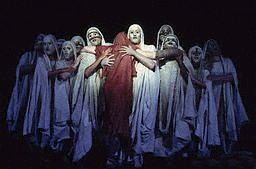|
And so any qualms Sir Peter may have had about
what those critics not flown out to Epidaurus for the special preview of
The Oedipus Plays might want to whisper into some suggestible oracle's
ear prove unfounded. For London audiences, this highly stylised yet rigorously
lucid production (colloquial translation by Ranjit Bolt) may lose a Grecian
night sky. But it gains the Olivier's acoustics, intimacy and comfort. (Anyway,
the Olivier auditorium was modelled on Epidaurus.)
Alan Howard's Oedipus is a towering centre
around which all else swirls like sweetpapers. Few other actors could convey
the swingeing reverses Oedipus suffers, from regal omnipotence to eyeless
exile, all from behind a mask. From razor-minded sleuth after truth in
Oedipus the King to blind old man whose life of stoicism, pain and
submission to divine will blossoms into ironic humour in Oedipus at
Colonus, it's a sign of Howard's greatness that he can convey so much
without the actor's most basic weapon - the face.
From the outset he transfixes - with a voice
that bends and stretches phrases, mining odd nuance and eliciting telling
emphases - as the hero inexorably drawn to self-discovery. In the first play,
Thebes is a blood-hued, bone-littered, plague-ravaged city encircled by flaming
braziers. Oedipus repeatedly advances towards the sack-clothed chorus/citizens
(who are also masked) on a jutting platform, meticulous in his questioning of
their complaints and zealous in his resolve to help.
Weird and ominous revelations result, but seem
less incredible in the eerie landscape conjured by some stunning stage images.
When Greg Hicks' mud-caked seer Tiresias, for instance, is led in by a tiny
child with a rope like some beast of burden, the moment is both surreal and
ghoulish.
The much shorter Oedipus at Colonus
seems more an elegaic coda to the first play, with old Oedipus allowed some
small revenge for a lifetime's exile while doing the Greek equivalent to
knocking on heaven's door. Once again Dionysis Fotopolous's stark designs -
this time with a solitary silhouetted tree upstage representing the sacred
grove beyond Athens and the muslin-swathed Chorus/Furies waving like marsh
reeds - lend powerful expressionistic meaning to Hall's engrossing
interpretation.
Graham Hassell
What's On in London, 25.9.96 -
2.10.96 |
